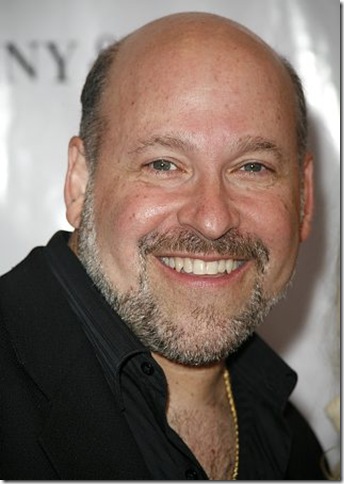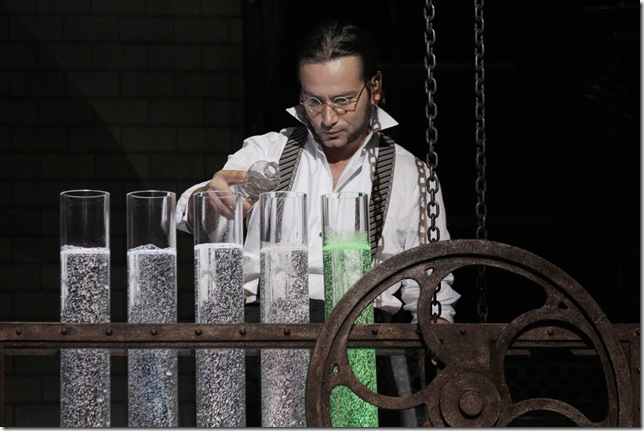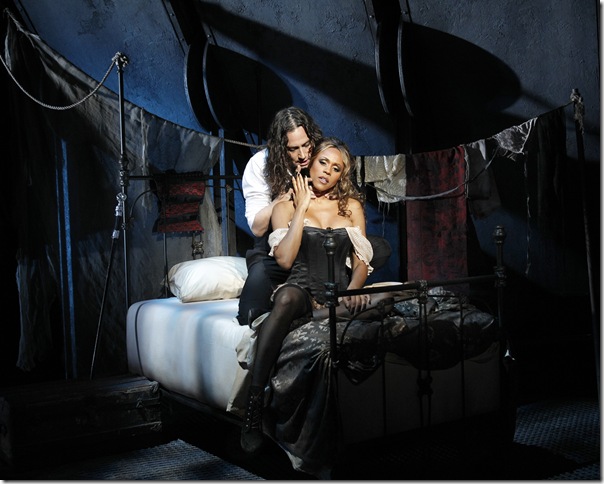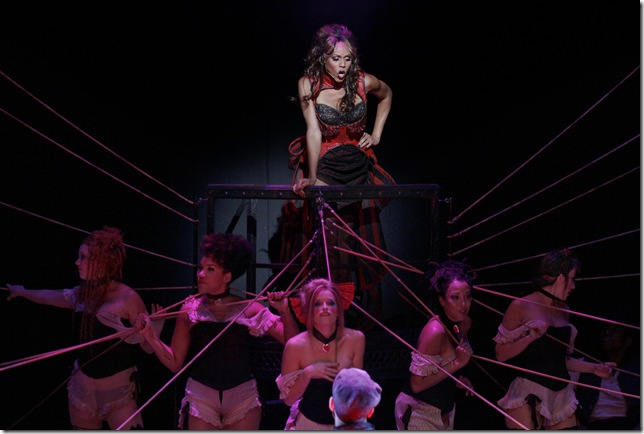Theater and pop music composer Frank Wildhorn, who grew up in Hollywood, Fla., has eight Broadway shows to his credit — from long-running cult favorites like Jekyll & Hyde and The Scarlet Pimpernel to such one-month flops as Wonderland and Bonnie and Clyde.
On Tuesday, a newly redesigned and reconceived production of Jekyll & Hyde arrives at the Kravis Center for a weeklong stay before heading to New York.
Last year, before the show began its 25-week tryout tour, Wildhorn spoke with me at his apartment in Lower Manhattan about his affection for Victorian melodrama, his career and his struggle for acceptance by the theater community.
Erstein: Tell me about your beginnings in music in South Florida.
Wildhorn: I wanted to be a football player and I played football for Hollywood High School. Music started for me there. At that time, in the mid-70s, before DJs and technology took over, being a live musician up and down the coast was fantastic. I started playing the school proms, the sweet sixteens and bar mitzvahs. Then I graduated to strip clubs and night clubs. It was a wonderful birthing ground to play a variety of styles of music.
Erstein: There are easier ways to make a living than writing for the theater. Why did you go that route?
Wildhorn: When I was 15, I got sick, the flu I think. And I saw on a weekend, back to back, Jesus Christ Superstar and West Side Story, the movie versions. And every musical vocabulary you could ever want was in those two shows. From classical to jazz, from Spanish to pop, all in there. And something hit me. I saw those movies and for some reason since then I loved telling stories with my music, not just writing pop songs.
Ironically, the theater started my pop career and there’s no question that wouldn’t be doing theater if it wasn’t for my success in the pop career. I sold some 75 million records of my songs in the ’80s, including Whitney Houston’s Where Do Broken Hearts Go?, and that bought me the freedom to go back into theater.
Erstein: Because of your success in the pop world, the theater community thinks of you as an outsider, don’t they?
Wildhorn: Yeah, I get accused of being “the pop guy” here, though I’ve done more new shows than anyone in the last 30 years. I still get people that don’t get it, who still think of me as this guy from L.A. who writes R&B hits and they’re not sure they want me playing in their sandbox. But we’re having fun. We’re having a great time.
Erstein: Hasn’t your theatrical success afforded you a very comfortable life?
Wildhorn: First of all, I have a place in L.A. and a horse farm upstate. This is my little New York pad, because I have to be here so much for recordings. That’s the other part of my life, don’t forget. I make records for a living, I still do that. Then of course I’m also always in rehearsals or auditions of whatever. Plus this place has a nice view and I like to write here.
Erstein: Is Jekyll & Hyde your most successful, most produced musical?
Wildhorn: Oh, by far. I know we’re well over 700 productions now. I think it’s been recorded now 32 times in 28 languages. It’s the gift that keeps giving.
Erstein: Is it also your most artistically satisfying show?
Wildhorn: You know, it’s funny. It’s like having children. It was my first child, the first show I ever wrote as a professional writer. It’s certainly the show that symbolizes my crossover from pop music to theater. And it has so many special meanings for so many reasons. When Linda (Eder) and I were married, this was our first adventure together. I wrote it for her. To see them play This Is the Moment when President Clinton was inaugurated, and in every Super Bowl, the World Series, the Olympics. The music of Jekyll & Hyde had this amazing life, even before the show hit Broadway.
But here’s the thing, (original director) Gregory Boyd’s production was so successful, but there was still a consensus in New York that Greg was too new to musicals, that Frank is this enfant terrible, that Linda had never been onstage, Bob Cuccioli nobody knew who he was. So even though we had all this success, the producers were very, very nervous. So they brought in a director from Stratford, a Royal Shakespeare Company guy named Robin Phillips.
What Robin, who is also a set designer himself, did was reinvent the show for Broadway. Some things I loved what he did, some things I didn’t like what he did. His set was based around this kind of red box thing he created, which I thought limited how he used the stage. But Robin did great work with the actors, especially Linda, and he gave the show four years on Broadway.
But with that said, there are songs I wish were in the show that weren’t. The look of the show was not exactly the way I would have liked it to be. Some of the casting I saw a little differently than he did.
At the end of the day, we had a success, it speaks for itself. But here and now we have a chance to get the production I want. So I’m excited. I’m excited for the world to see this one now. This is what Jekyll & Hyde will be for the next 10 -15 years.
Erstein: Why did you decide to bring it back now?
Wildhorn: This totally came from a man named Nick Scandalios, executive vice president of the Nederlander organization, who was a fan of the show. Last year he came to me and said, “I think it’s time.” I said, “Time for what?” “Time we bring it back.”
Erstein: Did that come as a surprise to you?
Wildhorn: Oh, yeah. I figured one day maybe if we’re lucky. But I’m a young guy, so the word “revival” feels foreign to me. I have a revival? I’m still figuring out how to do this, you know?
And he put together a great (pre-Broadway) tour, and the fact that we’ve coming down to South Florida is great, because it makes Mom very happy. It’s all about Mom. She’ll bring 800 of her closest friends. It’s always about Mom.
Erstein: What are some of the differences this time, compared to the earlier Broadway show?
Wildhorn: This has nothing to do with the earlier Broadway production. It will look totally different, it will feel totally different. Jekyll and Hyde have always been played by a baritone with a high range. Now I have Constantine Maroulis, a great, screaming rock tenor playing it. The whole show’s totally re-orchestrated.
There will be songs on the tour and on Broadway that were not in the first one. Bring On the Men, one of the icons of the show, wasn’t on Broadway because this crazy director at the time cut it. Of course we’re bringing it back, because it’s been in the show everywhere else in the world. I Need to Know, Jekyll’s first big anthem, was not on Broadway. It’s in there now.
Working with (director-choreographer) Jeff Calhoun, we decided to do a whole new interpretation. So it’s much more modern, it’s more atmospheric, it’s more impressionistic in its look and its tone than realistic. You can’t do Victorian London like I did in ’97 today. You can’t do big realistic Victorian sets. It’s going to smell of Phantom, Les Miz and Jekyll back then. Then it’s really a revival.
Erstein: What got you interested in this story in the first place?
Wildhorn: I was a student at USC, it was 1979, and there was the play Dracula with Frank Langella. This was way before there was Phantom of the Opera. It came to Los Angeles and I saw it and I loved it. I was, what, 20-21 years old, and I said to myself, “They’ve taken this Victorian horror melodrama and they’ve made it hip and sexy. I’m loving it and so are all my fellow students. And their parents are loving it.”
So I said to myself, “Let me go research some of this Victorian literature and see it there’s something I can do.” And I read [Robert Louis Stevenson’s] The Strange Case of Dr. Jekyll and Mr. Hyde, which is a tiny little book and there are no women characters in the book. I read it and thought, selfishly as a composer, wow, what a cool thing, if I can create a guy who has to sing in two different voices, two different attitudes, coming from two different places. And so I did it.
A few years before that I was a lifeguard on the beach in Fort Lauderdale. This was so beyond what I was dreaming about.
Erstein: Talk about casting Constantine in the title roles.
Wildhorn: If you saw him doing Bohemian Rhapsody on American Idol or YouTube it, you go “Obviously he’s Jekyll and Hyde.” It doesn’t take much of a stretch to see him in the part. He’s 6-4, has long hair and sings like a god. Look, this is going to change his life. As it does everybody who plays this role.
He’s onstage 2 hours and 15 minutes of 2 hours and 20 minutes. He’s playing two characters, he’s singing in two different styles. So, A) what an acting challenge for Constantine, and B) what a singing challenge.
Erstein: Had others campaigned for the role?
Wildhorn: Of course, but most of them are big stars who won’t do tours. And they want money that is the entire budget of the show.
[Lyricist-book writer] Leslie Bricusse and I had a great meeting in London with David Bowie. Bowie heard the score and he said, “I’ll do it three times a week for six months.” You can’t do that. Some of the stars who have sung these songs say they’re interested, but then when they realize what it takes to do it, they disappear.Erstein: Do you think you will ultimately wear down the critics and naysayers?
Wildhorn: I’m a musician and I’m a composer. I don’t try to overanalyze it. And if you knew me and knew my disposition, I’ve got far too cool of a life to worry too much about it.
Now, does it hurt me when they attack me sometimes? Yes, of course it does. When my mom reads it and says, “Why don’t they like my son?,” that hurts, but you deal with that. On the other hand, my mom knows how happy I am, how much I love my life, how much I can’t believe I get up in the morning and get to do this. So what am I going to worry about that for? I can’t do anything about it anyway.
Erstein: So why should South Florida come see Jekyll & Hyde?
Wildhorn: Because I think we have always come through and taken them on wonderful journeys. This is another new wonderful journey. It just happens to have a great brand name that they know attached to it. And they should come and support a Hollywood boy, who learned his chops down there and grew up down there.
Look, they’re going to have a great time. And hopefully we’ll deliver as we always have.
JEKYLL & HYDE, Kravis Center, 701 Okeechobee Blvd., West Palm Beach. Tuesday through Sunday. Tickets: From $25. Call; (561) 832-7469.



